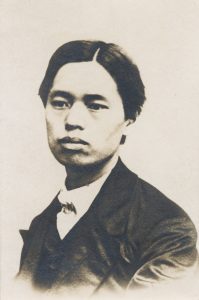
Kusakabe Taro, born as Yagi Yasohachi, was a trailblazer who was the first Japanese student to graduate from Rutgers College in 1870. Taro was a samurai who came to the United States from Echizen, later Fukui in Japan, and his arrival marked a significant point in history for both Japan and the United States. He travelled to America under his new name, Kusakabe Taro, because at the time of his trip it was still illegal to leave Japan and he intended to disguise his identity. During his time at Rutgers College, Taro proved to be a gifted student studying mathematics and physical sciences and became the first Japanese student to be inducted into Phi Beta Kappa. Aside from being the first Japanese student to graduate from Rutgers, Taro and a student from Amherst College were the first Japanese students to graduate from American colleges.
While at Rutgers, Taro befriended William Elliot Griffis, who also acted as a tutor to Taro. Griffis had a particular interest in Japan, specifically Fukui, while at Rutgers College. Unfortunately, Taro contracted tuberculosis before graduation, and he succumbed to the illness on April 13th, 1870, at his boarding house on French Street in New Brunswick. His bachelor’s degree and Phi Beta Kappa key were awarded posthumously due to his untimely passing, but in no way did his death detract from the significance of his achievements in his life. Following Taro’s death, William Griffis aided in the arrangement of a funeral for Taro. The funeral ceremony took place at the Second Reformed Church on Albany and George Street. His body was buried at Willow Grove Cemetery, blocks away from the church, and this remains his final place of rest.
Despite Kusakabe Taro’s unexpected and tragic death, his legacy marks a pivotal moment in the history between the United States and Japan. Taro opened a door between Japan and the United States during the Meji era of education reform, such that between 1868 and 1912, approximately 200 Japanese students emigrated to the United States to be educated. William Griffis also carried on this legacy by traveling to Fukui to teach in a local school, developing a strong relationship between the two countries. Griffis’ papers document much of his interactions with Taro, and these writings have allowed the legacy of Taro to remain prominent to historians. Taro sparked a relationship between Fukui and New Brunswick, which Griffis continued to develop after 1870, and this relationship has only grown stronger with time. In 1982, Fukui and New Brunswick made an official announcement of becoming Sister Cities, further growing the connection between the two cities. The life of Kusakabe Taro marked the beginning of a relationship that is celebrating 150 years of educational reform and academic endeavors that have drawn the United States and Japan together to pursue the modernization of education.
Sources:
Lamiell, Patricia. “Rutgers Commemorates First Encounter Between New Brunswick and Fukui, Japan.” Rutgers Today, news.rutgers.edu/feature-focus/rutgers-commemorates-first-encounter-between-new-brunswick-and-fukui-japan/20080130#.XjMr8S2ZPRY. Accessed 30 January 2020.
“Kusakabe Taro: The Samurai Connecting New Brunswick and Fukui.” Sister Cities International, sistercities.org/2017/10/11/kusakabe-taro-the-samurai-connecting-new-brunswick-and-fukui/. Accessed 30 January 2020.